Issue Will Head to Parks Commission Before Returning to Council for Final Decision on Trees’ Fate
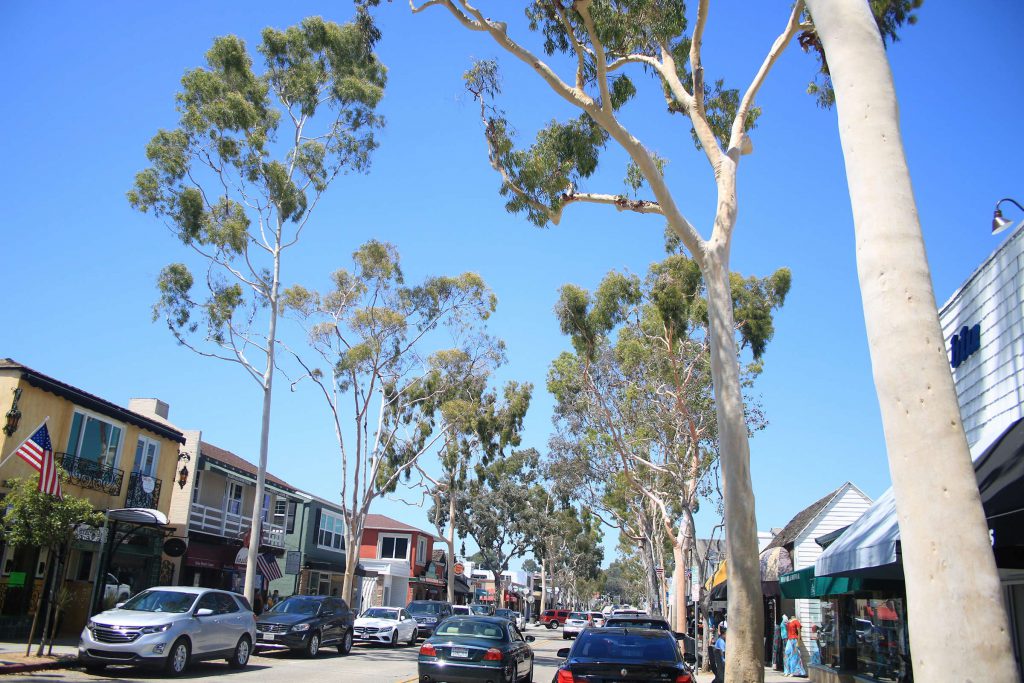
— Photo by Sara Hall ©
Addressing rumors, community concerns, and social media buzz, city officials confirmed this week that the trees lining Marine Avenue on Balboa Island aren’t on the chopping block quite yet.
The controversy surrounding the lemon-scented gum eucalyptus trees — centered around opposing arborists’ reports — came to a head Tuesday at a Newport Beach City Council study session.
More than 120 residents packed into Council chambers, some waving signs or cheering in support of keeping the trees intact. Many audience members were audibly frustrated during staff’s presentation.
After about two hours of discussion, the bulk of which was a presentation by city staff, followed by a handful of residents who spoke for two to three minutes each, Council members directed staff to include a community group’s independent advanced testing report in the presentation when the issues heads to the Parks, Beaches and Recreation Committee next month.
Several council members emphasized that the historic trees’ preservation is a worthwhile effort, and that their value and benefit to the community is significant.
“I am no tree hugger, but I am a sap,” said Councilman Kevin Muldoon.
The trees on Balboa Island help create a special and very unique experiences, he said.
This is a historic village and the trees are a big part of that, Councilman Brad Avery added. It’s an iconic sight, he added.
Residents have raised concerns that the city is making an unwarranted effort to remove the trees based on inaccurate information and despite outcries from the community.
“Staff has articulated that, in no uncertain terms, they have the ability to cut down these trees without anybody being able to stop them,” Muldoon replied. “And I’m trying to stop them.”
The study session allows residents to raise concerns and say, “we don’t trust city staff,” Muldoon noted.
“Your gut is right on this. Do not trust staff on this issue. Staff is misleading you,” Muldoon said.
There is a middle ground here, Muldoon said.
Several Council members noted that staff’s priority is to save money and be as efficient and thorough as possible, but in this case, it needs to be more of a priority.
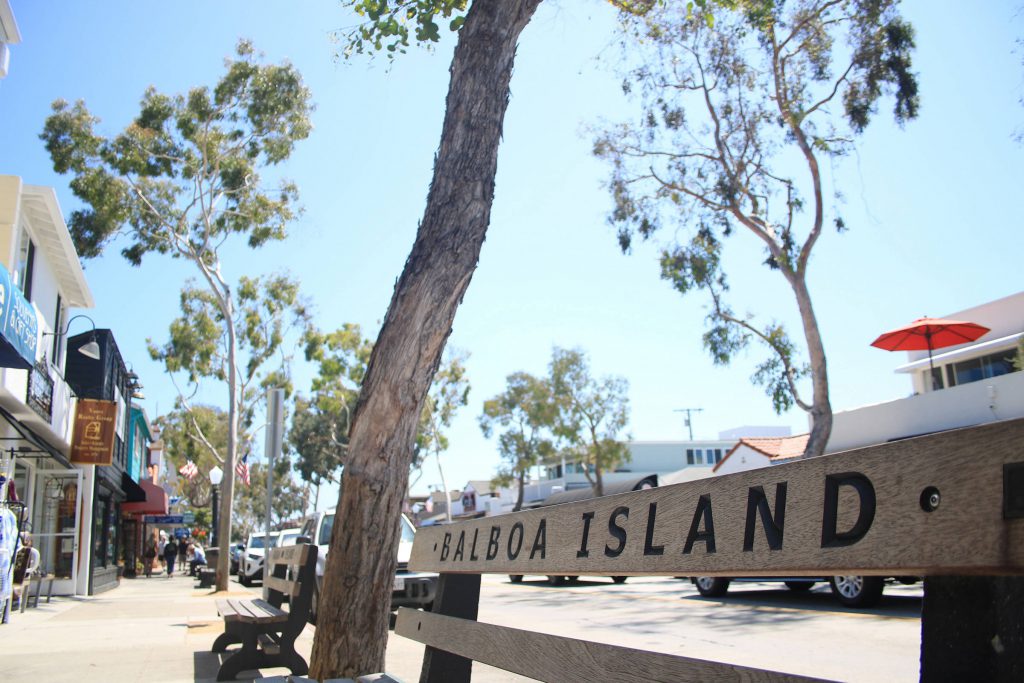
— Photo by Sara Hall ©
If more time and money need to be invested, for more extensive testing, then so be it, Mayor Diane Dixon said.
City Landscape Manager Kevin Pekar went over the history of the Marine Avenue trees. They first appeared on the iconic street in the 1920s, he noted, although none of the original eucalyptus trees are still standing.
A common phrase among arborists is “right tree for the right place,” Pekar said. He added that this hasn’t been true for the Marine Ave. eucalyptus since their inception.
The eucalyptus trees on Marine Avenue were designated as “special neighborhood trees” in 1988. The policy states that special trees shall be retained unless there are over-riding problems, such as death, disease, or “the creation of a hazardous situation,” which requires their removal.
Considering the crowded sidewalks and congested traffic and street parking, any risk to the tree creates a hazardous situation, Pekar said.
But removing the trees deemed dangerous does not mean Marine Avenue will be treeless. Several Council members agreed that the lemon-scented gum eucalyptus trees should be replaced by mature trees. Staff suggested replacement trees of a 24-inch box size.
There are currently five vacant tree wells that the city plans to fill.
Also, the process of evaluating and removing diseased trees has nothing to do with the conceptual rehabilitation project, Pekar added.
“There’s been a lot of information out there, some of it not necessarily correct,” Public Works Director Dave Webb said.
Webb went over the background of the Marine Avenue rehabilitation project,
In 2015, various groups on the island started talking about rehabilitating the street, Webb noted. The following year, then-Councilman Ed Selich secured $250,000 in the 2016-17 Capital Improvement Program budget to develop conceptual plans.
A Marine Avenue Committee was created, comprised of island residents and business owners, with the goal to develop an island-wide consensus on a preferred concept design, which would then be presented to City Council.
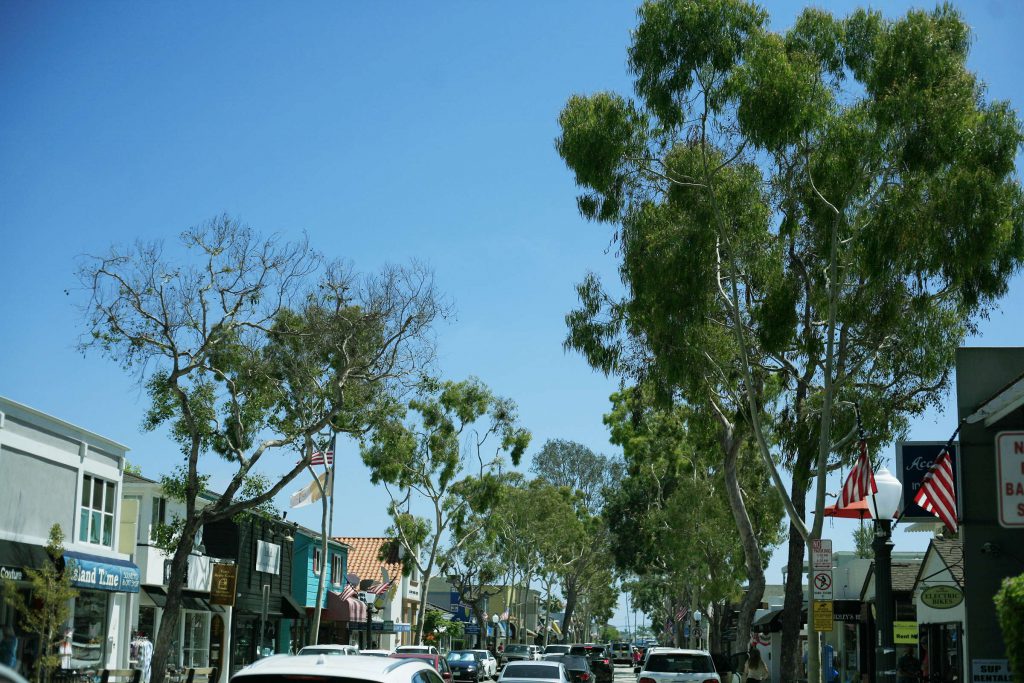
— Photo by Sara Hall ©
The newly created Balboa Island Preservation Association has been at the forefront of keeping the trees intact, with resident Jodi Bole heading up the group.
They argue that any redevelopment of Marine Avenue should maintain the quaint historical look and feel of the street, including keeping the existing eucalyptus trees.
In March, BIPA paid for an independent arborist to analyze and report on the Marine Avenue trees. The Arborgate Consulting Report, authored by consulting arborist Greg Applegate, recommended removing three eucalyptus trees.
Applegate reported that most of the trees were healthy and in good condition. He didn’t find any signs of root decay, Applegate said at Tuesday’s meeting.
The city contracted arborist Walt Warriner to assess the trees. He came to a different conclusion.
Warriner deemed 27 trees “high” for overall risk rating, which he recommended for immediate removal, and classified 10 more trees as “moderate,” and suggested they be re-assessed in about a year.
On Tuesday, Warriner reiterated his stance and replied to comments posted on social media.
“I stand behind my recommendation,” Warriner said. “I am not a ‘hit man,’ I’m an arborist.”
Pekar considered the 10 “worst” trees that he felt were the highest risk and could “fall completely over.”
“Are we exposing the city to potential liability?” Dixon asked
Anytime a report says there is a risk and, if something were to happen, it could be used against the city, City Attorney Aaron Harp confirmed.
“Considering the location, a lot of these older trees are reaching the end of their typical lifespan,” of about 50-60 years, Pekar said.
Pekar feels strongly those 10 should be replaced soon and that the 17 others should follow within two to three years.
But residents argued that lemon-scented gum eucalyptus trees are actually quite safe as street trees.
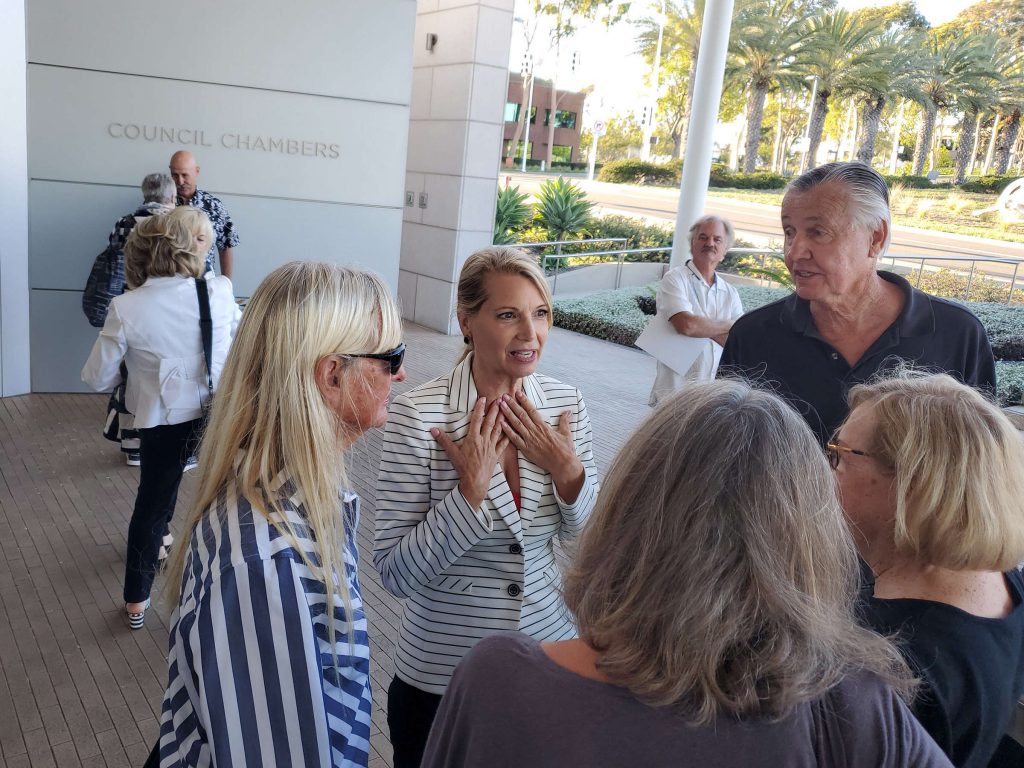
— Photo by Sara Hall ©
“I have visited Marine Avenue many times and I’ve admired the trees… and spent very little time lying awake at night worrying about the risk of those trees falling on me,” longtime Balboa Island resident Seymour Beek said.
They have significantly fewer limb breaks or other incidents than the often-confused blue gum tree, which is what lined Irvine Avenue when a tree fell on a vehicle and killed the driver in 2011.
Balboa Island locals then contacted Richard Harlow, chairman of the horticulture department at Orange Coast College and a board-certified master arborist. Harlow reviewed the trees and stated that the Marine Avenue lemon scented gum eucalyptus trees are well suited for their location and have long life spans. He saw “no signs of wood rot diseases that would signal immediate attention.”
Mayor Pro Tem Will O’Neill told the audience he’d “cut to the chase” because ultimately this issue is going to PB&R Commission, likely on Sept. 3. Council is not voting on anything yet, he confirmed.
“I’ve seen pictures of a treeless Marine Avenue,” O’Neill said. “That’s not before us… I’m at a loss (on this).”
Any decision is likely years down the road and there will be a lot of opportunity for public input, O’Neill said.
The conceptual design was put online and then taken down, Muldoon claimed, and there have been meetings behind closed doors.
“It has not been transparent,” Muldoon said.
If it comes to a decision to cut down some or any of the trees, it needs to be transparent, Muldoon emphasized. The process should be slowed down and City Council should vote before any trees are chopped down, he continued. Newport Beach residents have a right to be represented, Muldoon said, eliciting loud applause.
Council members agreed that after PB&R considers the issue it should return to Council.
Muldoon also directed staff to move forward with thoughtful consideration of the charm of Balboa Island when shaping their recommendation for PB&R.
City staff and Council members love the trees and want to keep them, but the city can’t wait if the trees are deemed dangerous, Councilwoman Joy Brenner noted.
Residents worried that the city was rushing to that determination. They need to be careful moving forward, said Dick Ashcroft.
“Once they’re gone, they’re gone,” Ashcroft said. “So tread lightly.”
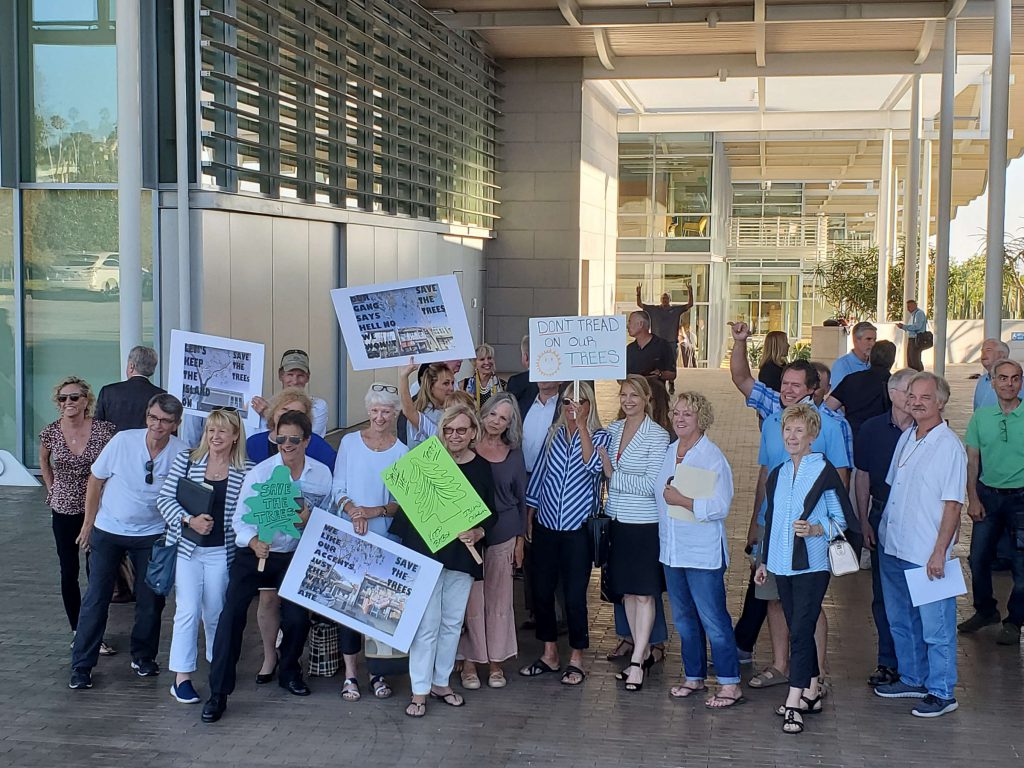
— Photo by Sara Hall ©




